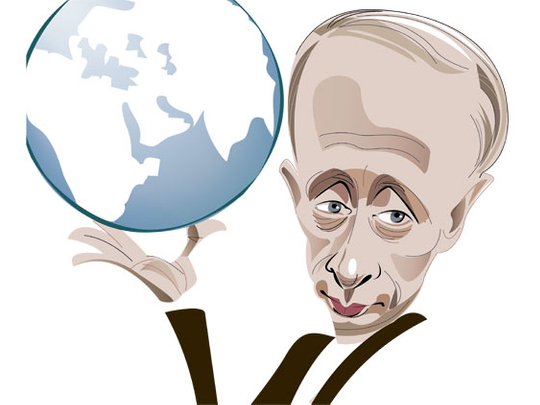
There is one incontestably great actor on the world stage today, and he has no interest in following our script. Russian Prime Minister Vladimir Putin — soon to be Russia's president again — has proven remarkably effective at playing the weak strategic hand he inherited, chalking up triumph after triumph while confirming himself as the strong leader Russians crave.
Not one of his international peers evidences so profound an understanding of his or her people, or possesses Putin's canny ability to size up counterparts. Putin's genius begins with an insight into governance that eluded the ‘great' dictators of the last century: You need control only public life, not personal lives.
Putin grasped that human beings need to let off steam about the world's ills, and that letting them do so around the kitchen table, over a bottle of vodka, does no harm to the state. His tacit compact with the Russian people is that they may do or say what they like behind closed doors, as long as they don't take it into the streets.
He saw that an authoritarian state that stops at the front door is not only tolerable but also more efficient. As for the defiant, he kills or imprisons them. But there are no great purges, no Gulag — only carefully chosen, exemplary victims, such as anti-corruption activist Sergei Magnitsky, who died in police custody, or the disobedient billionaire Mikhail Khodorkovsky, imprisoned on charges Russians regard as black humour.
Reawakening Stalinism
Western consciences may be briefly troubled, but Putin knows the international community won't impose meaningful penalties. Seduced by Kremlin policies — from oil and gas concessions to cynical hints of strategic cooperation — western leaders have too many chips in the game. And at home, the common people, the chorny narod, don't mind. Instead, they gloat when the czar cuts off the beards of the boyars (old aristocrat) — or humbles an envied oligarch.
As for gadfly journalists, Putin wagered that they could be eliminated with impunity, as in the case of Anna Politkovskaya. Our outrage is pro forma and temporary. Domestically, Putin's tactile sense of his people is matchless. His bare-chested poses seem ludicrous to us, but Russians see a nastoyashi muzhik, a ‘real man.' And his sobriety makes him the fantasy husband of Russia's beleaguered wives.
Not least, Putin has renewed Russian confidence in the country's greatness. Consistently playing an international role far greater than Russia's capabilities warrant, he reawakened the old Stalinist sense that while the people may suffer, they do so in service to a greater destiny. Internationally, he sizes up interlocutors with the deftness of the skilled agent-handler he was in the bad old days. His outbursts of temper and brutal language make news (while, again, appealing to his base), but his policies are cold-blooded, ruthless — and strikingly successful. It's worth noting how much Putin has achieved: Like his hero, Peter the Great, he tamed the new nobility (of wealth) and consolidated the power of the state.
He returned Russia to great-power status — largely through bluff. He steamrolled a one-sided new START agreement over American negotiators who desperately wanted a deal. His manipulation of Europe has given him virtually every pipeline agreement he wanted while sidelining Nato's new members in the east and keeping Ukraine weak and disunited. He dismembered Georgia but paid no price for it.
He has even achieved a grip over supplies for American troops in Afghanistan second only to the chokehold US granted Pakistan in a fit of strategic ineptitude. If Putin has a weakness, it's his disdain for economics. Russia relies on oil and gas exports to a potentially fatal degree. Yet that, too, stems from calculated policy: A diversified economy and consequent diffusion of wealth would make Russia far more difficult to control.
Today's relative handful of oligarchs fit perfectly into the mould of the old czarist nobility (if with fewer social graces): They spend ostentatiously, party abroad and remain politically docile. Putin would rather risk a monopoly economy than a proliferation of power bases. For centuries Moscow called itself the ‘Third Rome,' after the cities of St Peter and Constantine.
The allusion may be particularly apt, since Putin has done what a series of strong emperors did after the first fall of Rome or the Fourth Crusade's sack of Constantinople: He has restored, if briefly, a fallen glory.
Demographically, economically, developmentally, militarily, even educationally, Russia appears doomed to fierce decline. But one man of genius has brought his people a last, autumnal reprieve. Vladimir Putin is a dangerous man, but a splendid czar.
— Washington Post
Ralph Peters is a retired Army officer who specialised in Russia and its lost empire. He is an analyst for Fox News and most recently the author of Lines of Fire: A Renegade Writes on Strategy, Intelligence, and Security.









